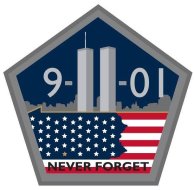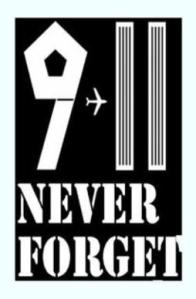On last week’s anniversary of the 9/11 attacks I saw post after post on Facebook asking that we “Never Forget” (a visual analysis of these posts is a whole different topic I won’t cover here). I know these posts were made by well-intentioned people still mourning those events and so my comments are not meant to suggest that those who posted images or comments with those words were doing something “wrong” or that I know everyone’s underlying intention in their posts. I don’t. But I do think that language choices matter and have consequences for the way we think about our world. And as I scrolled through my Facebook feed and saw that most people were posting images/comments with the phrase “Never Forget” while only a few posted images/comments with the word “Remember”, it got my attention. What does it mean when we frame our public memory of 9/11 in this way? When we ask the public to “Never Forget” instead of asking them to “Remember”? Is there a difference at all?
I think that there is. My first response to all of the “Never Forget” posts was, “Do people really think that those who lived through 9/11 will ever forget it?” Surely not. With the costs of wars waged on the back of 9/11’s horror still mounting, with the Patriot Act still chipping away at our civil rights, and with political rhetoric constantly steeped in direct references to the “War on Terror” and 9/11, how could anyone possibly forget?
Given that so much of the rhetoric that surrounds 9/11 is now entangled with the ever-present “War on Terror” it makes some sense that so many folks may find the “Never Forget” frame appealing, perhaps without even knowing why. Perhaps we encourage others to “Never Forget” because our politicians don’t want us to forget since so much of their power stems from what “Never Forgetting” seems to beget–campaign contributions, more power, etc. But it seems to me that when we say “Never Forget” we are placing focus on the act itself and the people that committed it. We’re asking that we never forget what happened and while part of that memory is certainly the lives lost, the primary focus is on the horrific crimes and their perpetrators.
What’s interesting about the plea to “Never Forget” is that it’s actually the case that Americans tend to be really, really good at forgetting, so I guess some could argue that the “Never Forget” message is something this country needs to hear. After all, before 9/11 we’d forgotten how our own policies helped al Qaeda develop. Before the Great Recession of 2008 we’d forgotten why we put the Glass-Steagall Act into place after the Great Depression. And now as we begin to fight ISIS, we’ve even forgotten that while our nation’s leaders were beating the drums of war after 9/11, a lot of citizens were warning that destabilizing areas of the Middle East would open up a power vacuum that would be filled by new terrorist networks, increasing world terror activity. In fact, President Obama (then Senator Obama) said this in 2002:
I know that even a successful war against Iraq will require a U.S. occupation of undetermined length, at undetermined cost, with undetermined consequences. I know that an invasion of Iraq without a clear rationale and without strong international support will only fan the flames of the Middle East, and encourage the worst, rather than best, impulses of the Arab world, and strengthen the recruitment arm of al-Qaeda.
We’ve forgotten that the very threat President Obama has to deal with right now is the threat that he very clearly warned us about. So, I suppose that one could argue that there is utility in the “Never Forget” meme because, after all, the majority of U.S. citizens seem to forget a lot of important stuff, including Santayana’s warning that, “Those who cannot remember the past are doomed to repeat it.”
But I think there’s more going on here. I think that the suggestion that we “Never Forget” encourages an anger (or even rage) against those who committed these atrocities. And, of course, they deserve that anger and rage. But they’re dead. And so focusing on their actions, as I believe “Never Forget” encourages us to do, doesn’t make too much sense to me. And since those men and most of their leaders are dead, who, then, becomes the focus of the anger and rage that “Never Forget” can encourage? I think everyone has to answer that question for themselves, but I believe it’s a question everyone has to ask themselves honestly followed by asking whether or not focusing anger and rage on a particular person, group, country, region, religion, or whatever actually helps anyone heal or solves any of the problems we now face.
I would prefer us to focus on “Remembering”. Throughout my day I saw a few posts with the simple word “Remember” or the phrase “Remembering those who lost their lives”. I think that remembering those people who lost their lives instead of “Never Forgetting” what happened is a much better idea for four reasons.
First of all, “Remembering” puts the focus on the families and friends of those who lost their lives on 9/11 and challenges us to remember the enormous burden felt every single day by the grandparents, parents, spouses, siblings, aunts, uncles, cousins, and friends of the people who died as a result of 9/11.
Second, it might also help us remember the enormous price paid (which is still being paid) by the first responders who did not die on 9/11, but who have encountered endless red tape and outright unwillingness by the government to take care of the many health issues they face as a result of the air they breathed as they continued their gruesome tasks for days and months.
Third, remembering those people who lost their lives on 9/11 will perhaps help us also remember all of the men and women who have fought in our nation’s military, many in countless rotations, and perhaps we’ll be more careful next time our leaders are beating the drums of war and we’ll think critically about what that war will actually cost those who have to fight it and whether or not those costs are really worth what we might gain. In addition, remembering our military might also encourage us to put pressure on our government, who is quite happy to send our military into harm’s way, but isn’t quite as happy to take care of the medical and psychological needs of those brave people once they return.
And finally (and, in part, in answer to the questions above about who “Never Forget” encourages us to blame), I suggest that “remembering” helps us consider those of the Islamic faith who have been unfairly abused by our fellow citizens who are looking for some place to put the anger that “Never Forget” encourages. And it helps us remember that just like with any religion, a few radical people using the rhetoric of their religion to do harm do not equal that entire religion and its followers.
Ultimately, I believe that asking us to “Never Forget” is easy because it doesn’t require us to ask the hard questions, We can simply focus on who did it and what they did. We can wallow in outrage, albeit a solemn outrage, and focus on how we feel.
But when we’re asked to “Remember” instead, I think we ask a lot of more ourselves. We encourage empathy towards all those impacted by 9/11 and we hopefully think to ourselves, “What can we do to make sure people never have to go through this again?” Perhaps we are encouraged to stand up and have our voices heard the next time our government is beating the drums of war or rolling back our civil liberties in the name of the ever-present “War on Terror”. When we “Remember” I think there’s a chance that we’ll also be better at actually never forgetting all of what 9/11 cost us and perhaps we’ll be less likely to continue our U.S. tradition of forgetting the important cultural contexts of some of our nation’s most tragic years.
In other words, we move the focus from us and put the focus on others. We move the focus from the hate that some people felt that day when they committed those heinous acts and we put the focus on the peace that the majority of people in this world yearn for. We move the focus from the things that divide us and we put the focus on the things we have in common as humans.
“Never Forgetting” is easy. “Remembering”, I believe, is much harder.
Postscript, 2019: Jon Stewart and first responders (who haven’t died of their illnesses yet) have to bite, scratch, kick, and shame congress into funding their healthcare. Every. Single. Time. “Never forgetting” isn’t at all about not forgetting. If it really was, they wouldn’t have to fight like they do for support because we’d remember those first responders regularly and put pressure on congress to not even let this be an issue up for debate. “Never forgetting” seems more likely to be a means of giving us permission to forget except for one day a year.


As a Jew, “never forget” brings to mind the Holocaust. We are told to “never forget” in the context of, “Someone tried to wipe us off the face of the earth recently. We will never forget that and will make damn sure it doesn’t happen again.” I’m all for that sentiment, but perhaps we ought to do more remembering as well… as in remembering the vibrant Eastern European culture that was destroyed by the Nazis, and honoring that.
Here’s some food for thought: why is it “never forget” the Holocaust, but it’s “remember” the Alamo?
It’s so funny you mention that, Naomi, because I thought the same thing while writing. Being from TX, I knew that phrase before I ever knew what the Alamo was!
I have an idea why “Remember the Alamo” is the common phrase. On history.com’s website it says “For Texans, the Battle of the Alamo became an enduring symbol of their heroic resistance to oppression and their struggle for independence, which they won later that year.” (While history.com might not be the most reputable website, it surely could be said to represent the collective memory of the general American populace.) In the quote, it is accentuating the heroes at the Alamo, not the “other” to which they fought against. On the other hand, when we remember the Holocaust, there is almost always a focus on the evils of the Nazi regime. Therefore, “never forget” is used more often when speaking of the Holocaust.
I’d say that’s a pretty good theory, Chas. And it certainly makes sense in the context of 9/11 and the rhetoric of “evil” that the US regularly employs.